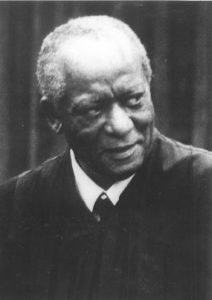
James Parsons
*James Parsons was born on this date in 1911. He was a Black lawyer and judge.
From Kansas City, MO, James Benton Parsons was the son of James B. (a minister) and Maggie Parsons. The Parsons family moved to Decatur, Illinois, when he was still very young. The music captured his attention and imagination as a child and young adult. He attended James Milliken University and Conservatory, receiving his B.A. in music in 1934.
He studied political science at the University of Washington, graduating in 1940. Parsons taught music and political science at Lincoln University, Jefferson City, MO, 1934-1938; acting head of music department at Lincoln University, 1938-1940; supervisor of instrumental music, Public Schools of Greensboro, NC, 1940-1942; volunteered U. S. Navy, 1942-1945. He married Amy Margaret Maxwell after discharge. Parsons attended the University of Chicago for his M.A. in political science in 1946 and LL.D. in 1949.
Parsons worked at the law firm of Gassaway, Crosson, Turner & Parsons, 1949-1951; taught constitutional law at John Marshall Law School, Chicago, IL, 1940-1951; assistant corporation counsel for the City of Chicago, 1949-1951; assistant U. S. district attorney, 1951-1960; Cook County Superior Court, judge, 1960-1961; U. S. District Court Judge, Chief of Court, Chief Judge Emeritus, Senior Judge, 1961-1992. In 1992, he initiated the James B. Parsons Scholarship Fund.
He was the first Black named to the U. S. District Court with life tenure. An outspoken jurist, Parsons was appointed by President John Kennedy in 1961 and presided for more than 30 years before his retirement in 1992. Parsons made news in 1969 when he condemned Blacks for getting caught up in slick "white man's crimes." In an interview with The New York Times, Parsons claimed that Blacks had neither the education nor the background to commit such crimes as counterfeiting, mail fraud, embezzling, safe cracking, and jewel theft with any degree of skill "Because the society has prevented [them] from getting into that world."
Opportunities to work as engravers, a good start for counterfeiters or watchmakers and helpful if you want to crack safes, were institutionally denied to Blacks. "I am not saying to my people that they ought to get into crafts and skills and big business to steal, or to learn to steal cleverly;" he felt it was "especially stupid" for Blacks to get involved with those types of crimes because they risked a greater chance of getting caught.
He received many awards, including honorary degrees, and Parsons Elementary School was dedicated in his name in 1967 in Decatur, IL.
Citation of Recognition for Outstanding Service as Chief Judge of the District Court, Chicago Bar Association, 1981; Outstanding Service Award, Chicago State University, 1984. Parsons's tenure on the bench was not without notable legal incidents. The New York Times obituary cited a federal case in which he sentenced 47 men to jail for price fixing. Parsons also played a crucial role in the air traffic controllers' dispute in their 1970 strike.
In 1987, Parsons had to uphold the Tenant's Bill of Rights in Chicago. Not afraid of ruffling some feathers, he ruled that the Daley Center in Chicago could publicly display nativity scenes the following year. Parsons retired from the bench in 1992, although he continued to perform some functions for a few months following his official retirement, including swearing in new citizens. James Parsons passed away on June 19, 1993, at 81.
United States District Court for the
Northern District of Illinois
Chicago, Illinois